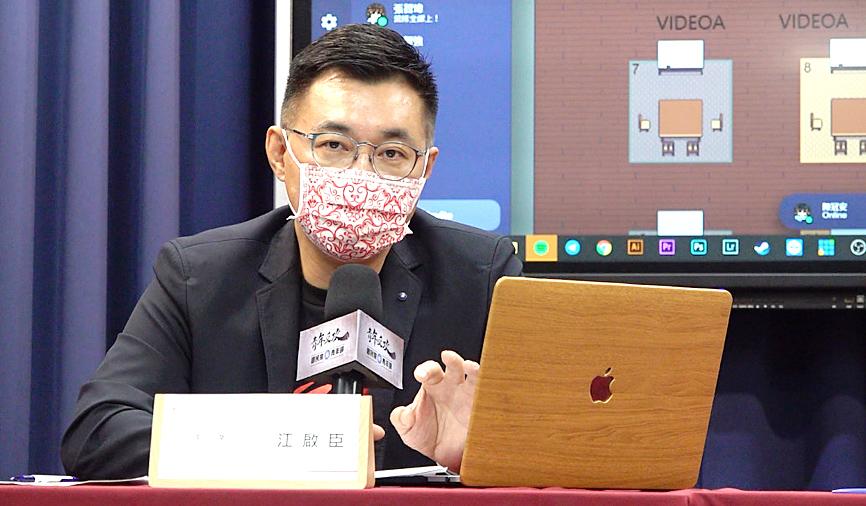The government must include young people in its COVID-19 vaccination plan if its goal of herd immunity is to be achieved, Chinese Nationalist Party (KMT) Chairman Johnny Chiang (江啟臣) said yesterday, as he criticized the ruling party for failing to purchase enough vaccines to cover adolescents.
Addressing a virtual news conference held by the KMT’s Youth Department, Chiang reiterated his call for the Democratic Progressive Party (DPP) administration to purchase safe, internationally recognized vaccines for the nation’s millions of young people.
Failing to purchase vaccines today would be tomorrow’s regret, he added.

Photo: Shih Hsiao-kuang, Taipei Times
In addition, Chiang raised concerns about rising joblessness and limited stimulus for younger age groups.
The unemployment rate is likely to climb as students graduate, he said, citing data indicating that 80 percent of graduates are willing to accept a lower salary if it means finding a job.
However, only about 20 percent are expected to find employment, he said.
Adding to what Chiang calls a messy stimulus rollout, young people have been “pushed to the sidelines,” he said, calling on the DPP to convene a provisional Legislative Yuan meeting to address these issues.
Meanwhile, the Economic Democracy Union yesterday released a statement urging the private sector not to cross the “red line” dividing generosity and collusion when procuring vaccines on behalf of the government.
Hon Hai Precision Industry Co and Taiwan Semiconductor Manufacturing Co are in the process of procuring vaccines from Germany’s BioNTech, which has contracted China’s Shanghai Fosun Pharmaceutical Group to distribute the vaccines in Taiwan, China, Hong Kong and Macau.
The government is allowing the companies to make the purchases on its behalf as long as they are manufactured and packaged by the original manufacturer and delivered straight to Taiwan.
To ensure vaccine quality and prevent China from taking the opportunity to belittle Taiwan, the union recommended four additional requirements.
First, the firms should insist on using the original German packaging, and reject labeling advertising Chinese consent or its authorization of Shanghai Fosun to “care for the health and welfare of Taiwanese compatriots,” the union said.
Second, vaccines should be delivered directly from Germany on Taiwanese airlines, it said.
Third, ownership of the vaccines should be transferred to the government before they depart from Germany to ensure that they meet contract requirements and prevent China from delaying delivery, it added.
Fourth, the firms should not cooperate with Shanghai Fosun on any ceremonies or promotions regarding the procurement, it said.
Regarding reports that the companies have not named any government representatives in their negotiations, the union said that commercial procurement contracts cannot legally involve government authority or coerce the government into accepting certain arrangements.
The union also urged the companies to ensure that the contracts do not consent to the collection or transfer of personal data to China.
There is much that the government should do to procure vaccines, but “falling into China’s political trap” is not one of them, the union said, calling on Taiwanese to remain wary of Beijing’s political machinations.

A decision to describe a Chinese Ministry of Foreign Affairs statement on Singapore’s Taiwan policy as “erroneous” was made because the city-state has its own “one China policy” and has not followed Beijing’s “one China principle,” Deputy Minister of Foreign Affairs Tien Chung-kwang (田中光) said yesterday. It has been a longstanding practice for the People’s Republic of China (PRC) to speak on other countries’ behalf concerning Taiwan, Tien said. The latest example was a statement issued by the PRC after a meeting between Singaporean Prime Minister Lawrence Wong (黃循財) and Chinese President Xi Jinping (習近平) on the sidelines of the APEC summit

Taiwan’s passport ranked 34th in the world, with access to 141 visa-free destinations, according to the latest update to the Henley Passport Index released today. The index put together by Henley & Partners ranks 199 passports globally based on the number of destinations holders can access without a visa out of 227, and is updated monthly. The 141 visa-free destinations for Taiwanese passport holders are a slight decrease from last year, when holders had access to 145 destinations. Botswana and Columbia are among the countries that have recently ended visa-free status for Taiwanese after “bowing to pressure from the Chinese government,” the Ministry

HEALTHCARE: Following a 2022 Constitutional Court ruling, Taiwanese traveling overseas for six months would no longer be able to suspend their insurance Measures allowing people to suspend National Health Insurance (NHI) services if they plan to leave the country for six months would be abolished starting Dec. 23, NHIA Director-General Shih Chung-liang (石崇良) said yesterday. The decision followed the Constitutional Court’s ruling in 2022 that the regulation was unconstitutional and that it would invalidate the regulation automatically unless the NHIA amended it to conform with the Constitution. The agency would amend the regulations to remove the articles and sections that allow the suspension of NHI services, and also introduce provisional clauses for those who suspended their NHI services before Dec. 23, Shih said. According to

‘SIGN OF DANGER’: Beijing has never directly named Taiwanese leaders before, so China is saying that its actions are aimed at the DPP, a foundation official said National Security Bureau (NSB) Director-General Tsai Ming-yen (蔡明彥) yesterday accused Beijing of spreading propaganda, saying that Chinese President Xi Jinping (習近平) had singled out President William Lai (賴清德) in his meeting with US President Joe Biden when talking about those whose “true nature” seek Taiwanese independence. The Biden-Xi meeting took place on the sidelines of the APEC summit in Peru on Saturday. “If the US cares about maintaining peace across the Taiwan Strait, it is crucial that it sees clearly the true nature of Lai and the ruling Democratic Progressive Party (DPP) in seeking Taiwanese independence, handles the Taiwan question with extra